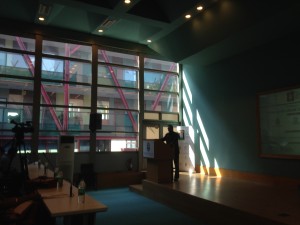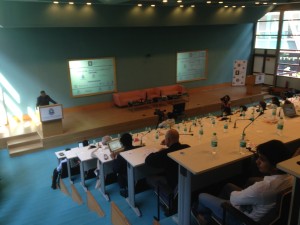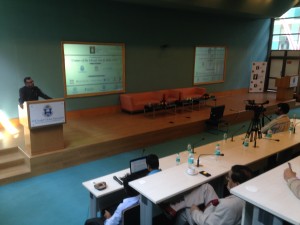In the second day of the conference, we were based at a new University outside of New Delhi called the O.P. Jindal Global University. This institution was founded by a partnership between the charismatic founding Vice Chancellor, Raj Kumar, and O.P. Jindal, an Indian billionaire who made a fortune on steel and other primary resources. Naturally the enormous campus is enclosed in steel beams, and features a beautifully landscaped set of greens and an array of buildings that stretch out onto the horizon. A large Indian flag waves serenely in the middle and approximately 2000 students attend. Raj Kumar greeted our conference very graciously, and hosted us for the day with a nice lunch, a cultural program and a dinner. The highlights for me of this conference was to be part of a panel on “Innovative Science Pedagogy” with Arjendu Pattanayak from Carleton College and Somak Raychaudhury from Presidency College. All of us presented what amounts to about 60 years of experience teaching science in a liberal arts context, and I thoroughly enjoyed the discussions with both of them about matter, determinism, and our theories of how best to teach science to undergraduates. It helps that all three of us are in physics or astrophysics, but I think more than having a common science between us we share a deep enthusiasm for teaching and sharing the mysteries and excitement of science with our students. Another notable talk included on from Neil Lutsky, who took a year off from Carleton to teach psychology at the new Ashoka University (he finds the students “talented, motivated and engaged” and “grateful” to have a chance to learn liberal arts). Bennett McClellan from Jindal shared his thoughts about the ways in which universities can be founded to provide not just for the 21st century but for the 22nd and 23rd century – with effective management and governance, adopting some of the principles from his mentor Peter Drucker. Jane Schukoske shared her work with the very interesting foundation known as the S.M. Sehgal Foundation that helps improve the life of women within rural India, and my friends Amlan Goswami and Somnath Sen arrived from Bangalore to share the latest work they are doing from the Indian Institute for Human Settlements, a fascinating think tank that studies the many dimensions of the Indian urban experience. Their take is that by studying the complex mix of culture, economics, architecture, resource limitations, and science, it is possible to understand the “messy” and rich lived experience or urban areas.





